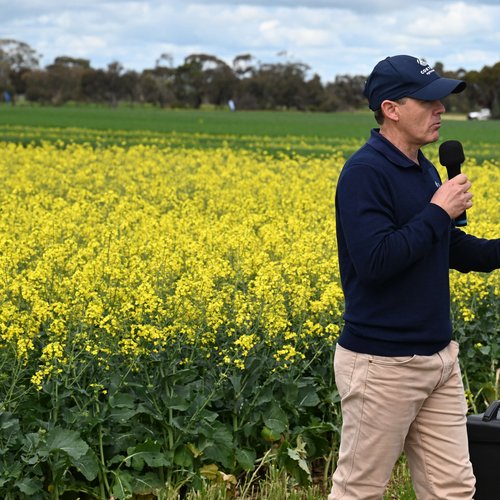A research project led by Charles Sturt University with Food Agility and other agribusiness partners aims to equip the ag supply chain with a transparent and credible tool to understand and manage natural capital and greenhouse gas (GHG) emissions.
Dr Mark Frost, senior lecturer in agribusiness in the Charles Sturt School of Business, is the Chief Investigator for the project with the Food Agility Cooperative Research Centre (CRC).
He said farmers and agribusinesses are under pressure to demonstrate that they are improving the carbon footprint of the commodities they produce.
“Farmers need a credible way to demonstrate they are reducing their carbon footprints,” Dr Frost said. Capturing this data will also help the entire ag supply chain meet statutory reporting requirements, and if possible, gain a competitive advantage.
“Direct and indirect Greenhouse gas (GHG) emissions generated from agricultural production is now a reporting requirement for all participants in the agricultural supply chain, and is an important factor in reaching environmental, social and governance (ESG) milestones.
“Furthermore, financiers are facing mounting pressure to both fund climate-related activities and report climate-related exposure, while consumers across domestic and international markets are gradually turning to products that are environmentally sustainable.”
Dr Frost said the Australian Agricultural Sustainability Framework (AASF) designed by the National Farmers Federation and the Australian Farm Institute with funding from the federal government has been introduced to assist farmers to be able to understand the finance, supply chain and market expectations about sustainability and ESG reporting.
“With this understanding, all the players in and across all segments of agri-food value chains require credible and tangible ‘measurement, reporting, and verification’ (MRV) systems that can account for emissions reductions resulting from an intervention they have taken that would not have otherwise occurred,” he said.
Dr Frost said this project aims to create credible and tangible MRV systems for the entire agribusiness value chain which will account for emissions reductions resulting from an intervention that would not have otherwise occurred.
“A strong, standardised MRV system will enhance financial products, assist in reducing investment risks, and cultivate brand awareness and trust among consumers, both domestically and internationally,” he said.
“This will result in benefits flowing back to all players across the value chain, including farmers and agribusiness.”
The project will be road-tested at the Global Digital Farm, a 2000-hectare commercial farm based at Charles Sturt in Wagga Wagga.
Food Agility chief scientist Professor David Lamb said the farm will become an open, transparent benchmark for industry, and will demonstrate these farmer-centric tools in action.
“Our access to the Global Digital Farm means we are uniquely positioned to demonstrate the credibility and effectiveness of the project’s reporting mechanisms and show farmers how they can validate their own practice change,” he said.
The research component of this project is the development of the GHG emission reporting framework and the natural capital reporting framework. It will:
• Develop a framework for reporting GHG emissions from agricultural production that provides data that can be used by farmers and other stakeholders in the ag supply chain
• Develop a framework for natural capital reporting and measurement that is consistent with regulatory reporting requirements and recognised by farming stakeholders while being user-friendly for farmers
Dr Frost said there are considerable benefits from this research initiative:
• Producers – a reporting framework that is efficient, resource effective and that utilises existing information as much as possible
• Farming groups – a framework that measures GHG emissions and natural capital that provides financial and non-financial benefits to producers
• Ag supply chain – a framework that measures GHG emissions and natural capital that assists them meet statutory reporting requirements, and if possible, gain a competitive advantage
• Sector – an end-product that will meet consumer demand and satisfy possible export market requirements.
The research partners with Charles Sturt University and Food Agility CRC are the Cool Soil Initiative, and Sustainable Food Lab (USA).
Initially, this research will benefit farmers from north-east Victoria through to Central Western NSW.




